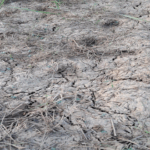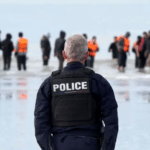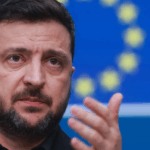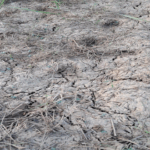
The dry wind sweeps across the wide plains of Ghana’s Savannah Region, carrying with it the dust of a land growing weaker each year. Once-green farmlands now crack under the sun’s heat, while rivers and streams dry up long before the next rainy season arrives.
Here, where life depends on the rhythm of the rains, the changing climate is forcing people into desperate choices and turning neighbours into rivals.
Across the region, rising temperatures, erratic rainfall, and the gradual southward march of the Sahara are destroying farmlands and water sources. The result is growing tension between local farmers and migrant herdsmen, each struggling to survive on shrinking land.
What was once a peaceful coexistence is now a battle for survival.
When Survival Breeds Conflict
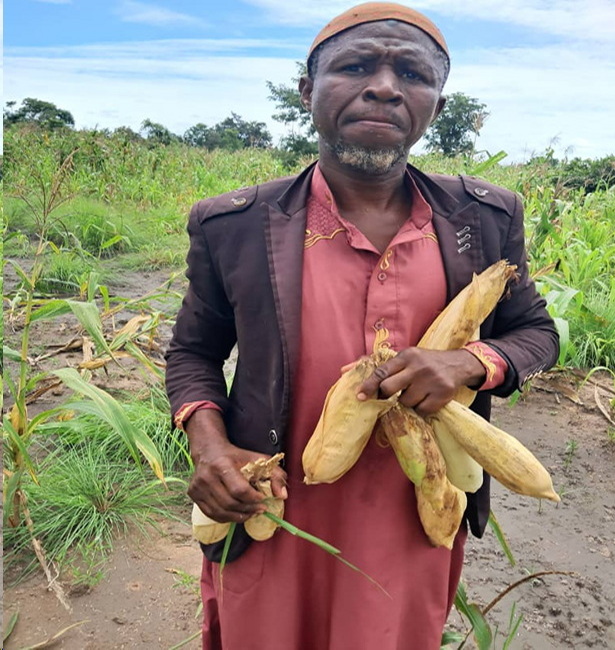
Mallam Yussif, Peasant Farmer at Daboya
For the local farmer, shorter rainy seasons mean smaller harvests and more uncertainty. Every acre of land becomes precious. So, when large herds of cattle arrive, trampling crops in search of pasture and water, the result is anger and loss.
For the herdsmen, however, migration is no choice it is survival. Their cattle are their livelihood, their pride, and their culture. But as pastures in the Sahel dry up, many are forced to move south into Ghana in search of grass and water.
Alhaji Yakubu Musah Barry, General Secretary of the Fulbes community in Ghana, said his people are not intentionally destroying farms.
“But the challenges that we witness in Ghana between the herders and farmers is because many of the herders are migrants,” he explained.
“They migrate into the country and move around with their cattle in an environment that they don’t know much about, thereby trampling on people’s investments.”
He added that the herders are being driven by harsh weather conditions.
“They are being forced by bad weather from the Sahel region in search of greener pastures and water for their cattle,” he said.
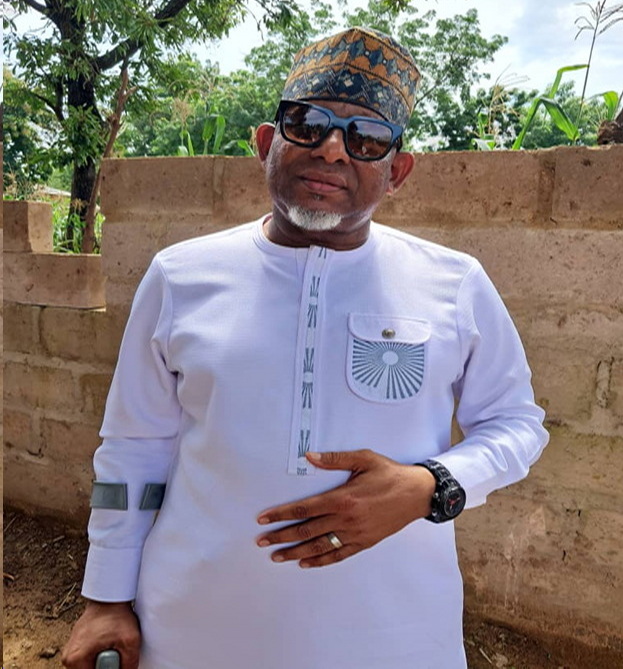
Alhaji Yakubu Musah Barry,General Secretary, Fulbes in Ghana
But when herds enter farmlands, farmers see it as an invasion an attack on their sweat and their survival. These encounters often lead to heated confrontations, destruction of property, and sometimes, tragic loss of life.
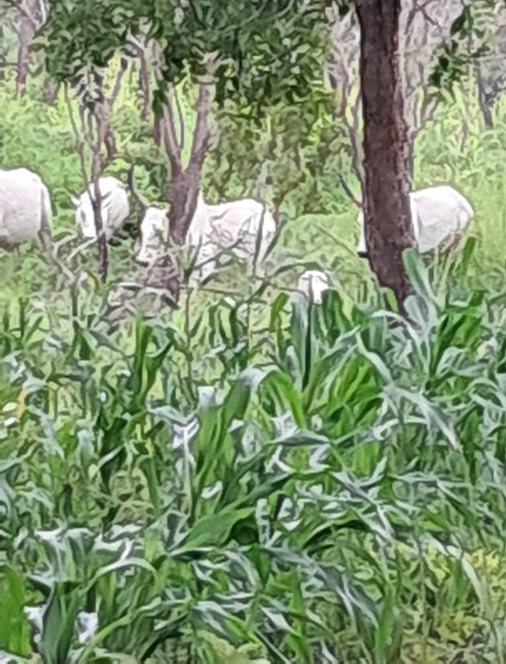
Herds In A Maize Farm At Kongo
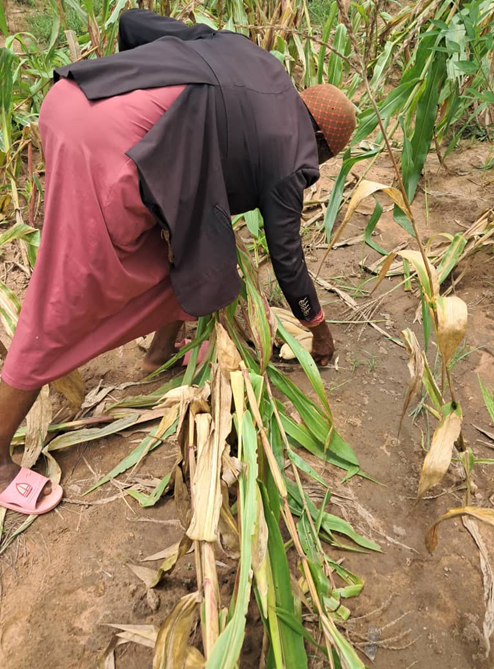
Migrant herds grazed on Mallam Yussif ‘s farmer at Daboya
In 2023, a clash between a migrant herder and a charcoal burner over access to water in a suburb of Daboya, North Gonja District, led to the death of the charcoal burner.
Three years earlier, a herder absconded with 34 cattle in the Northern Region and was later found in Daboya. That case remains under police investigation.
Tensions on the Rise
At Kabampe, a farming community near Damongo, farmers and herders constantly face off. Recently, several cattle were found dead on farmlands, and three young farmers were arrested by police for questioning.
According to Gbenapewura Abdalla Mahama Adam, Savannah Regional Coordinator of the Savannah Farmers Brigade, both groups are victims of the same problem
“Both the farmer and the herder need each other but have climate change as their common enemy,” he said.
He explained that before the herders migrated into the region, farmers did not have problems with their crops being destroyed by cattle.
“The cattle owners don’t intend to destroy any farmer’s farm, but their hired hands pastoralist migrants on seasonal migration whenever they come, because they have a large flock of cattle, are only looking at where they will get feed,” he said.
“They don’t care if they enter into a farmer’s farm, and this is deliberate, and that’s what makes the farmers angry, as you can find a herdsman uprooting cassava and throwing it down for his cattle to graze,” he added.
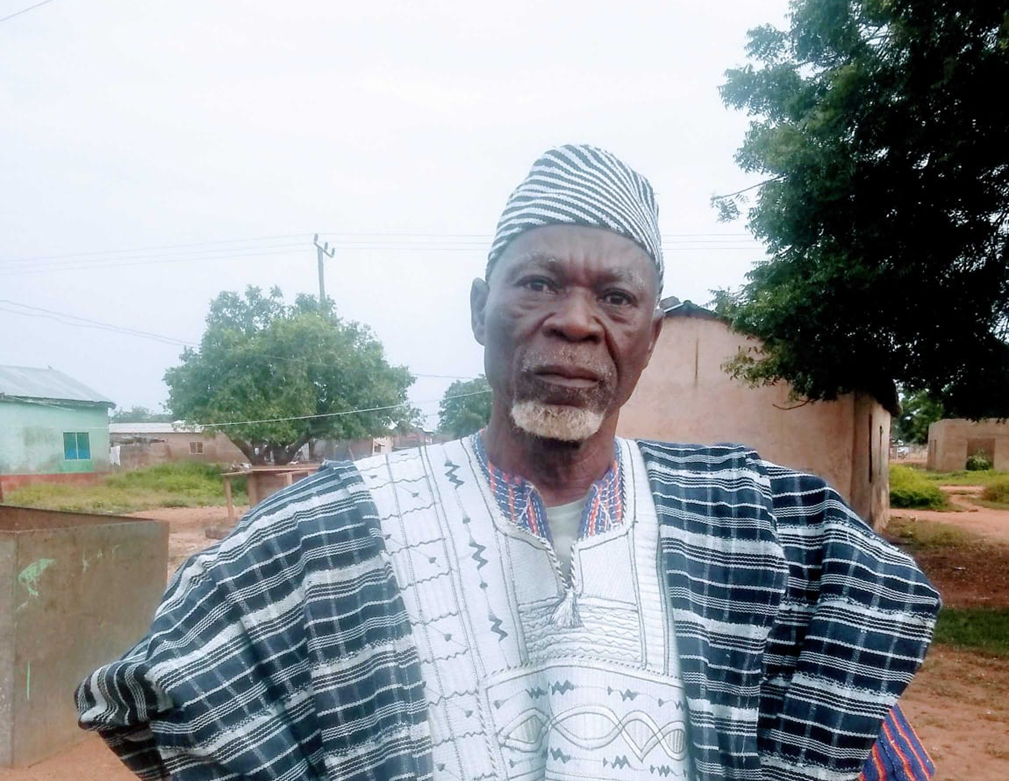
Gbenapewura Abdalla Mahama Adam Coordinator, SFB
Faces of a Changing Climate
In Damongo, 76-year-old farmer Lawrence Nuzagla has cultivated the same land since 1977. The weather used to be predictable rains came on time, and the soil was fertile. Today, he says nothing feels certain anymore.
His crops no longer grow as they used to, and the growing number of herders in the area makes farming even more difficult.
To him, the herders are not just competitors they are outsiders who do not respect local customs or farmland boundaries.
But on the other side of this struggle is Moussa Jallo, a migrant herdsman from Mali who has seen the grasslands of his youth turn to dust.
He now leads his cattle hundreds of kilometres southward into Ghana, hoping to find green pastures and water.
For Jallo, the open land is meant for all. His way of life grazing cattle in the open is a tradition passed down through generations.
He says he feels misunderstood and unfairly blamed, even though he is only trying to keep his animals and his family alive.
When the Earth turns hostile
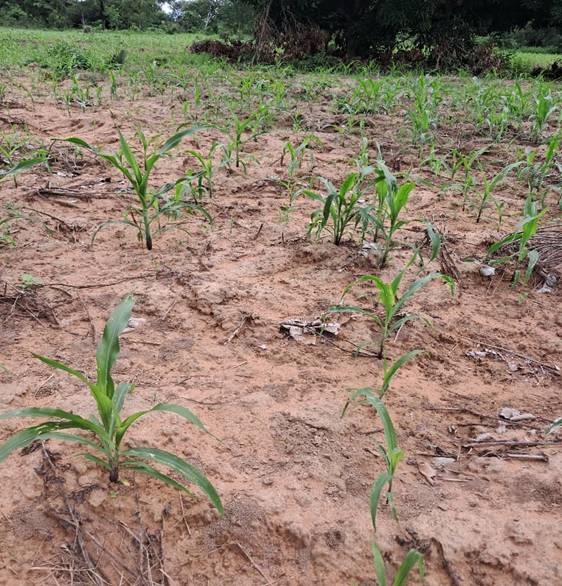
Maize farm under hot weather at Grupe
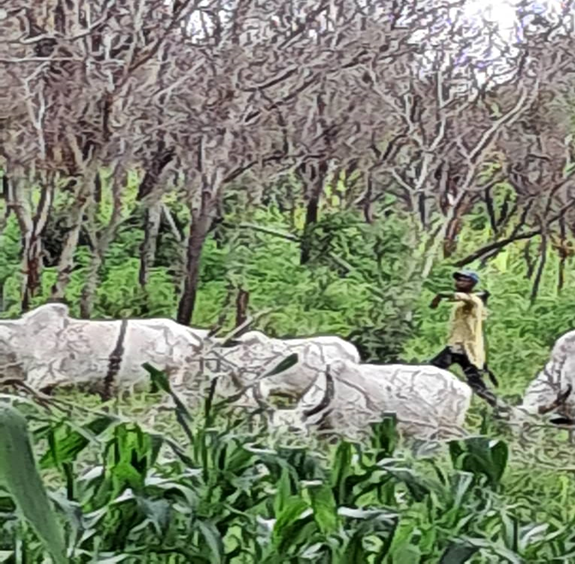
Migrant herder, with cattle grazing on maize farm at Kongo
During the dry season, when rivers dry up and food is scarce, tensions often reach their peak. Cattle, starving and thirsty, stray into farms. Farmers, desperate to protect what little they have, fight back.
These confrontations can quickly turn violent.
Chief Inspector Odurowaa Grace Boateng, the Savannah Regional Police PRO, confirmed that the police handle several farmer-herder cases each year.
“To touch on those in West Gonja Municipality: two cases were brought before us. One involved herders and farmers from Kabampe, and another involved the killing of a cattle owner. Suspects in the Kabampe case were arrested and put before court, while the Busunu case is still under investigation to track the perpetrators,” she said.
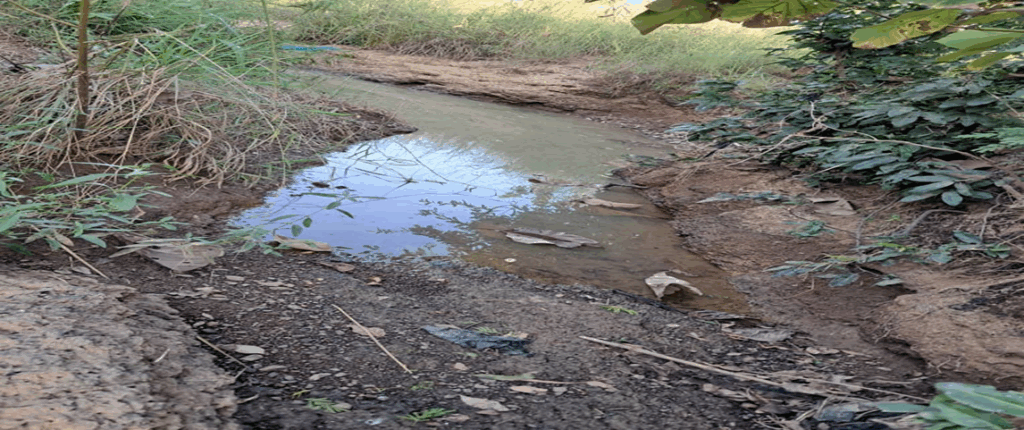
River drying up at Soi No1 Seeds of Peace
To stop the cycle of violence, the Savannah Regional Peace Council, led by a Catholic priest, has created community-level dialogue platforms.
These meetings bring together farmers, traditional leaders, herdsmen, and agricultural officers to discuss disputes and find peaceful solutions.
The council’s chairman, Rev. Fr. Aanyere said he discovered a pattern during one of the engagements.
“Mostly herders took their cattle to the farms at midnight for grazing, and sometimes the farmers even discover the owners, and yet they [herders] win their cases. And that galvanized the proposal for dialogue engagement and also the formation of the mixed mediation committee with all interested parties,” he said.
He added that the committees in Makuma, Maluwe, Madari, and Tinga are now functioning well.
“With the cooperation of herdsmen, the committee got back about GHS94,000 to the farmers as compensation,” Rev. Fr. Aanyere said.
A Path Forward
The Savannah Regional Minister, Mr. Salisu Be-Awuribe supports the idea of livestock ranching but believes the private sector should lead.
“Yes, you can see President John Dramani Mahama setting up a corridor in an open land [livestock ranching] in Yapei. So, I think a private person can provide that facility for a fee. The cattle will be under his control, and also, he should be able to provide the animals with water,” he suggested.
The idea of ranching — where livestock are raised in controlled areas — could help reduce open grazing and prevent further clashes.
Ghana has previously experimented with state-run ranching, such as the Wawase Ranch, which faced resource challenges. Experts say a public-private partnership could make such systems more sustainable.
Sulemana Seidu, the Savannah Regional Director of Food and Agriculture, agrees that climate change is everyone’s problem.
“It’s not only a threat to crop production but to animals as well,” he said.
“Because the livestock are supposed to get fresh pasture and water, and so if they don’t get it, it will mean that they will be migrating until they get to where they can graze and water.”
Similarly, Mohammed Mumuni, Assembly Member for Apeliso Electoral Area, proposes a Public-Private Partnership (PPP) to create permanent grazing lands and modern ranches.
“The idea, if implemented, would go a long way to reduce the tension between local farmers and migrant herders and, by extension, mitigate the effect of global warming in the region,” he said.
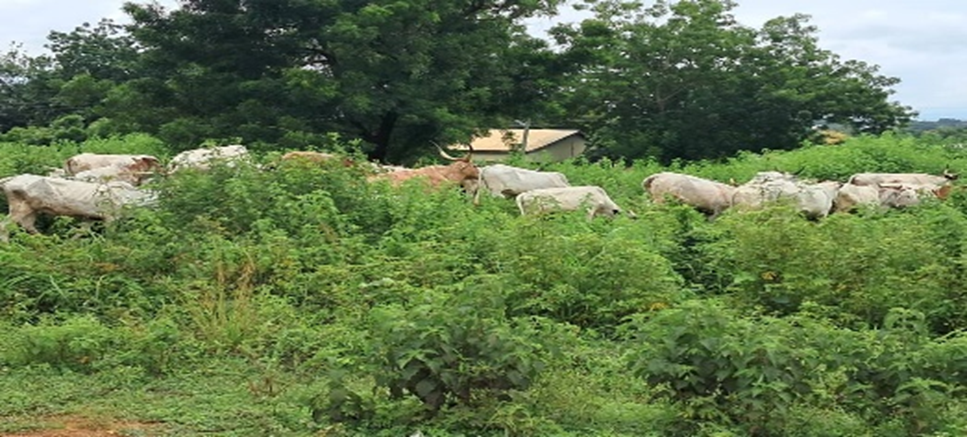
Cattle in open grazing at Bole
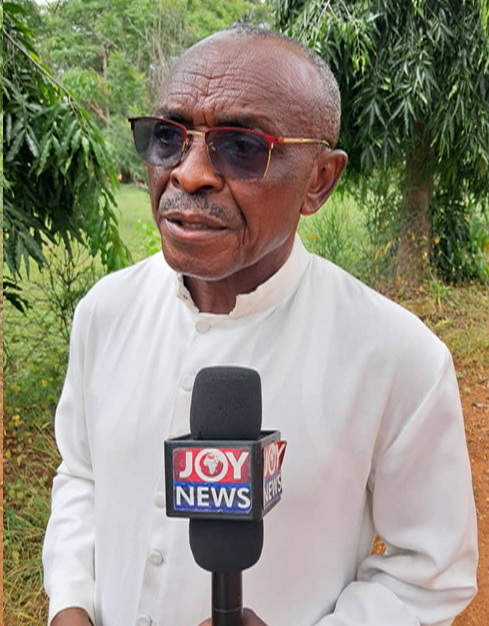
Rev. Fr. Lazarus Aanyere, Chairman, Peace Council-S/R
A Call for Action
Experts agree that peace cannot come through violence or eviction. It will require dialogue, planning, and investment in climate adaptation.
Solutions include clear grazing corridors, modern ranching, drought-resistant crops, and efficient irrigation. Above all, it requires communities to see beyond division — to realize that both farmers and herders are victims of the same climate crisis.
As one elder put it during a community meeting, “When the land fights back, no one wins.”
This is a JoyNews -CDKN-University of Ghana C3ss project with funding from CLARE R41 Opportunities Fund.
- President Commissions 36.5 Million Dollars Hospital In The Tain District
- You Will Not Go Free For Killing An Hard Working MP – Akufo-Addo To MP’s Killer
- I Will Lead You To Victory – Ato Forson Assures NDC Supporters
Visit Our Social Media for More

